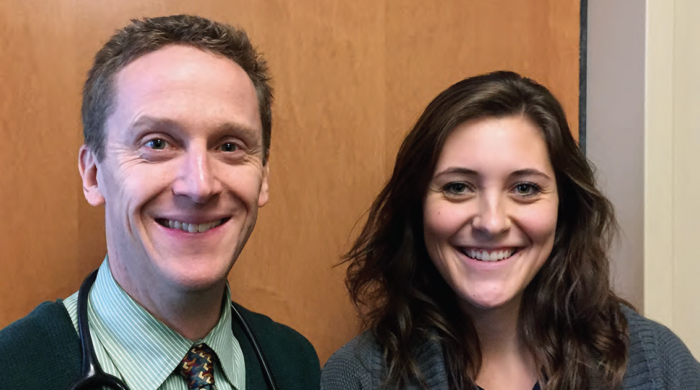With the advent of electronic medical records (EMRs), laptop computers have become a fixture in physicians’ exam rooms. And that, as many doctors will tell you, is a mixed bag.
In the words of WWMG Family Practice Dr. David Lindstrom, “Easy data access benefits the patient, but the data entry process does not. On one hand, you want to be a good doctor with record-keeping and get all the information, and on the other hand, you want to be a good doctor as far as personal interactions.
In a way, the computer has driven a wedge between those two aspects of quality patient care.” His solution for bridging that gap? Hiring a medical scribe to take over real-time EMR data entry, thus eliminating the need to divide his attention between the patient and the computer screen.
What is a Medical Scribe?
“With paper records, data entry was easy, whereas with EMRs, data entry is time-consuming and more frustrating. You have to enter information in the right box, in the right screen, in the right drop-down menu. There were times when it was actually embarrassing. If a patient gave me a lot of information, I would be typing for several minutes. One person even asked: ‘Am I supposed to say something else?’ I could tell he was thinking: ‘Do I reach for a magazine?’ It could get awkward.”
Not any more. Shelby Short, Dr. Lindstrom’s medical scribe, began working with him at the end of last summer, after initial preparation that included “about 10 sessions of classroom training and seven to 10 days of floor training.” She is present for all his office visits unless a patient refuses, which she says has happened only a handful of times. “Sometimes there is something personal that they want to discuss with Dr, Lindstrom.”
Otherwise, as patients are speaking during the HPI (history of present illness) interview, she’s recording on a laptop their information, in their words.” She also records specifics of the exam and instructions for follow-up, although Dr. Lindstrom dictates all medical decisions and treatment plans.
As far as being intrusive, “she’s a fly on the wall,” notes Dr. Lindstrom. “She doesn’t say anything. She doesn’t show a response, even though some patients try to get a reaction from her. If they have any initial fears, those disappear after a few minutes because all they hear is occasional clicking.”
That EMR record does not become permanent until Dr. Lindstrom reviews and signs it. “Initially, I had to do quite a bit of editing; as the weeks have gone by, more and more I read it and find that it reflects my voice.” Short, a graduate of Washington State University with a Psychology major and a minor in Spanish joined the medical scribe program to obtain medical hours for Physician’s Assistant school. “I’m aiming toward a couple of thousand hours,” she says.
You can reach Everett Family Medicine at 425-317-8025
Originally published May 2016
